My Truth
Words are strange. They are the building blocks of our language; signifiers that carry meaning. But that meaning can be imprecise or changing.
Think of the word love. Its meaning can change based on a variety of factors. Telling your spouse you love them carries a different weight than telling your pet you love them. Or using love to describe your favorite food or book. The meaning of a word can change based on context, audience, or tone.
Or culture.
Every culture has language specific to its time and place. Words and their meaning can change over time and culture. Such is the case with the word truth.
Christians have always held to the notion that there is such a thing as objective truth.
By and large, our culture does not have a strong understanding of the term truth. As we leave Postmodernism, wherein truth was stripped of all meaning and made completely relative, our culture has realized that truth must exist in some form. This agreed upon form of truth is now found in people’s stories. Experience has become the lens through which modern minds process and respond to thoughts and ideas.
When people say “my truth” they often mean “my story.”
We all have lenses through which we see the world. These lenses affect how we view the world, God, truth, others, and ourselves. As we work to understand God’s Word, we have to be aware of the lenses we use. If our lens is purely our own experience, we will read Scripture as if we have the right to interpret God’s message in a way that agrees with what we want to be true based on our experience. Sharing our experiences with others is a great way to connect, but experience makes a poor lens.
As disciples of Christ, we must have our lens shaped by the truth of Scripture. God’s word has much to say about what and who truth is. In John 17, Scripture provides us with Jesus’ prayer to the Father in which he prays for his disciples. Through this prayer, Jesus revealed what truth is: “Sanctify them in the truth; your word is truth.”
Jesus flat out said that God’s word is truth.
Later, the apostle Peter says the Word of God is eternal truth which lives forever (1 Peter 1:23). Jesus described himself as “the way, the truth, and the life” and said that “no one comes to the Father except through me,” (John 14:6).
This biblical view of truth is an antidote to our cultural understanding of truth. Through Scripture we know that absolute truth exists, the Word of God is true and unchanging, and faith in Jesus is the only true way to know God. The truth contained in Scripture is true for all times, all peoples, and all places.
Yet, the idea that truth and experience are equitable still peaks its head into our Bible studies. While earnest believers might not purposefully confuse their personal experience with truth, the reality is that sometimes believers interpret Scripture in light of their experience.
Think of the language that you might hear in group, “Here’s what this passage means to me…” In reality though, when we approach Scripture as a church or a small group, God has one intended message. We must do the work to understand the context and language, but God’s meaning is not unknowable. When we share our response to the Bible with others, instead of saying what a passage means to me, it is more accurate to describe how a passage applies to me.
For example, say your small group is reading through the Gospel of Luke, and you’ve come to the parable of the prodigal son.
You might hear people in the group share the truth of the passage through their own lens. One person might say this parable means to them that God is waiting for us to return to him. Another might say this passage means to them that kids have to make mistakes on their own and return to God. Still others may say that they see this passage as a warning against the temptations of the world.
But, to really understand the parable in Luke 15, we must understand that God has truth that he is communicating to us. This means that we have to do the work to understand what the passage means to God and not to us. If we do the work of understanding the context of Luke 15, we can see that Jesus is talking to religious leaders (Pharisees) who were upset that Jesus was speaking to, and eating with, sinners. The parable of the prodigal son then, was originally intended to illustrate God’s goodness to sinners and to challenge the Pharisees to see and replicate that goodness.
Once we have a common understanding of a passage, we can discuss how it applies to us. Some in our small groups might identify with the younger brother running from the Lord, and realize they need to repent. Others might see themselves to be more like the Pharisees and need to repent of their unloving attitudes. And still others might just need to be reminded of how good God is.
When we become Christ followers, the lens through which we see the world radically changes.
However, we still live in this world and we often put on its cultural lens without realizing it. Scripture makes it clear that there is such thing as Truth. A definite, objective, eternal truth. As Christ-followers, let’s honor Jesus as the Truth and seek after him with all that we have.












